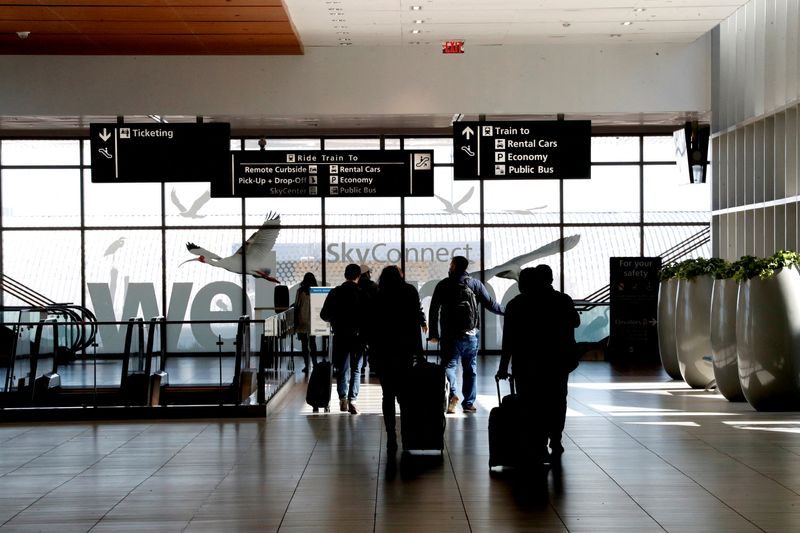By David Shepardson
WASHINGTON (Reuters) -U.S. air passengers would be offered refunds for delayed flights and transportation on rival carriers under sweeping consumer protections proposed on Tuesday after a series of disruptions including a holiday meltdown at Southwest Airlines (NYSE:LUV).
U.S. lawmakers said the wide-ranging measures would require airlines to pay at least $1,350 to passengers denied boarding as a result of an oversold flight, prohibit airlines from further shrinking plane seat sizes pending regulatory changes, and give consumers new rights to sue airlines for unfair practices.
Passengers would receive refunds for any flights that arrived more than an hour late.
U.S. Senators Richard Blumenthal and Edward Markey joined with other senators in introducing the "Passengers’ Bill of Rights and the Forbidding Airlines from Imposing Ridiculous Fees (FAIR) Act."
Southwest sent apologies to 2 million customers, CEO Bob Jordan said, after more than 16,000 flights were canceled in the week ending Dec. 29 when its crew scheduling software failed. The outage was a boost to consumer protection activists.
Blumenthal predicted airlines would mobilize an army of lobbyists to fight the proposals despite having received $54 billion in government assistance during the COVID-19 pandemic.
"They come into this moment with reduced power," he told reporters in a phone call, adding airlines "have lost a lot of credibility" by opposing new consumer protections.
Airlines for America, a group representing major airlines, said the "proposed policies in this bill – instituting government-controlled pricing, establishing a private right of action and dictating private sector contracts – would drastically decrease competition, leading to a subsequent increase in airfare."
In the past airlines have succeeded in defeating consumer protections proposed by lawmakers. Congress in September 2018 dropped plans to mandate "reasonable and proportional" baggage and change fees" in the face of heavy lobbying.
A group of U.S. House of Representatives lawmakers also introduced the FAIR act which they said in a statement would "prohibit airlines from charging unreasonable fees... not proportional to the costs of the service actually provided."
Lawmakers want to require airlines to provide ticket refunds and alternative transportation, including for instance seats on other air carriers, for flights delayed between one and four hours.
The bills would direct the Transportation Department (DOT) to facilitate interline agreements between airlines to ensure availability of alternative flights. Southwest Airlines does not have such agreements.
The bills would requires airlines to disclose "true costs of flying" and offer lowest fares on multi-segment flights and allow passengers to sue airlines for unfair and deceptive practices.

They would eliminate a cap on fines that DOT charges airlines for violating consumer protection laws and prevent "airlines from negotiating low, slap-on-the wrist fines for egregious conduct."
In August, a bipartisan group of 36 state attorneys general said states and federal agencies should have new powers to investigate airline passengers' complaints and complained DOT had not done enough to hold airlines accountable.